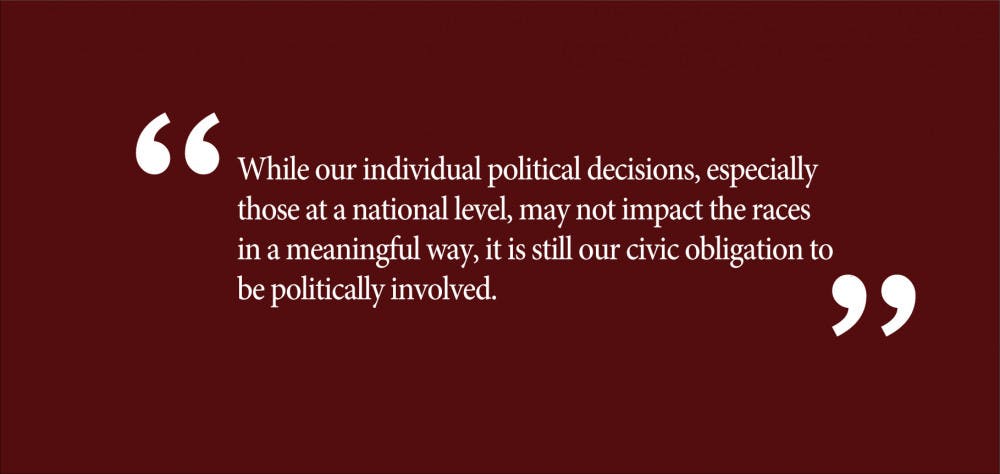On Tuesday, Nov. 19, a man spoke before a panel of congressional representatives and millions of Americans tuned in to watch an investigation into President Donald Trump’s potentially impeachable interactions with Ukranian officials. That man was Lieutenant Colonel Alexander Vindman, the National Security Council director for Europe and a recipient of the Purple Heart for his valor in Iraq. In his opening statement, Vindman addressed his father, an immigrant who fled with his family from the USSR to the United States when Vindman was just a child. “Do not worry,” Vindman said. “I will be fine for telling the truth.”
Later, Rep. Sean Maloney (D-NY) asked Vindman about his statement: “And why do you have the confidence that you can do that, and tell your dad not to worry?” The Lieutenant Colonel shook his head slightly, perhaps in preparation for the weighty words he was going to utter, and responded, “Congressman, this is America. This is the country I’ve served and defended. That all of my brothers have served. And here, right matters.” In so few words, Vindman outlined the morals that undergird what it means to be not only an American president, but an American citizen. To us, right and wrong is supposed to matter.
A few days before Vindman’s moving testimony, I got in an argument with a friend over the importance of voting. To me, voting has never been a question. But I had also grown up in a family that emphasized the importance of civic responsibility. I am from Ann Arbor, an extremely politically active and progressive city within a state that was decided by fewer than 11,000 individual votes in the 2016 election. It was easy for me to think that my singular vote truly mattered, even on a national level. But to my friend, a Californian, none of those statements held true. He argued that in national elections, his state was always going to go blue anyways, regardless of his individual action. I responded that elections and political engagement mattered beyond a choice between two candidates for the nation’s highest office, as significant as that was. Elected officials include our school board members, local judges, and state and national representatives. Voting is the method by which citizens can ensure that their representatives and governing bodies reflect their own values and opinions. But he was indifferent to this argument as well, saying that if he did not feel well-informed on the candidates, he would prefer to not vote at all.
But this reasoning is precisely why we should educate ourselves on candidates at every level of office. While our individual political decisions, especially those made at a national level, may not impact the races in a meaningful way, it is still our civic obligation to be politically involved. Even if a race’s outcome is all but decided before we cast our individual votes, it is nonetheless vital to vote. Staying home reflects and contributes to a cynicism about our political system that threatens the values of American democracy.
Many may sympathize with my friend’s argument more than mine. And it is true that today’s politics seem more cynical, polarized and depressing than ever. But while remaining willfully ignorant of politics because it is tiring or overwhelming is understandable, it also reflects a certain kind of privilege. Yes, many Brown students are lucky enough not to have felt their daily lives be affected by whoever is in the White House. But make no mistake — politics, whether from the White House or not, can affect each and every one of us. Voters ostensibly determine what happens to their lives at the local, state and national levels. They even have the power to significantly influence the trial of the most powerful elected official in the world — it has been public opinion, more than the individuals beliefs of U.S. senators, that has determined whether an impeached president has been removed or not. Democracy is a gift, but it is also an important responsibility: We only get as much from the government as we put in.
It is easy to take our privileges as citizens for granted. When I was looking for a response to my apathetic friend, I asked my father for advice. He has resided in America for almost thirty years since immigrating as a graduate student from South Korea, but he became a citizen less than five years ago. He told me, “When I was just a resident in this country, I still had to pay taxes and work a job. People think that those are responsibilities of American citizens, but I had those responsibilities even when I was not a citizen. All the decisions made by politicians still affected me and my family, but I had no say in the matter. I might as well have been invisible. As a current citizen of this country, I believe that it is not only my right, but my absolute duty, to vote for what I want and for what I think is right.”
I hope that my father, my friend, and all Americans were listening when Lieutenant Colonel Vindman said that here, in America, what is right matters. And I pray that even in the face of endless political cynicism, Vindman’s call to our collective civic obligations gives them as much hope as it gave me.
Bliss Han ’23 can be reached at bliss_han@brown.edu. Please send responses to this opinion to letters@browndailyherald.com and op-eds to opinions@browndailyherald.com.





